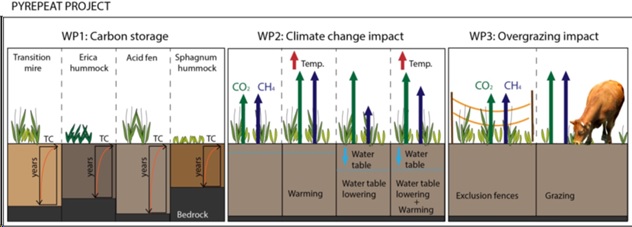Project PYREPEAT: How climate change and overgrazing affect carbon cycling in Pyrenean peatlands?
In December 2022 the project PYREnean PEATlands and carbon (C) cycling: the role of overgrazing and climate change (PYREPEAT) started. This project aims to characterize the distribution of peaty soils and carbon in Pyrenean peatlands, and to analyse the effect of overgrazing and climate change on them. Dr. Aaron Pérez Haase, a member of IRBio and the Department BEECA of the Facultat de Biologia, and Dra. Carolina Olid, of the Department Dinàmica de la Terra i de l’Oceà de la Facultat de Ciències de la Terra lead the project.
PYREPEAT will be carried out in different wetland systems of Central Pyrenees, of which good botanical and ecological knowledge is already available. In some, the distribution of peaty soil horizons will be evaluated in detail and the distribution of organic matter (and C) will be analyzed in relation to physiographic, ecological and vegetation parameters. The age of the different peat horizons will also be determined by analysing different radioisotopes (210Pb, 137Cs, 14C). In other systems, taking advantage of livestock exclusion experiences in operation since 2017, different ecosystem processes will be analysed in areas subject to intense grazing compared to excluded plots. Additionally, the same processes will be analysed in small experimental plots subjected to overheating with Open Top Chambers, to water stress caused by a specific drop in the water table, or to both factors. As descriptors of these processes, the emission of greenhouse gases (CO2 and CH4) will be measured, among other variables. The evaluation of these processes with good space and time resolution will allow us to know in detail the dynamics of organic matter in the wetland systems studied, and extend the findings to other comparable systems in the Pyrenees.
